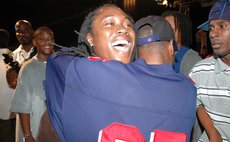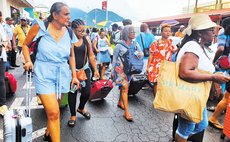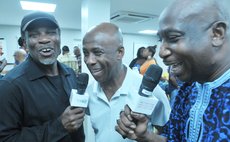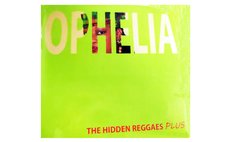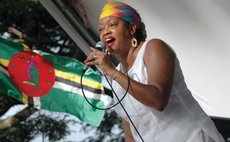Gordon Henderson talks music
Since the 1970s, 'Cadance-lypso' has been the signature sound of Dominica, but now local music insiders are scratching their heads as they grapple with two tough questions.
Has the island's music culture lost its way? Is Dominica's distinctive Cadence-lypso music becoming a lasting legacy, or is it in danger of enduring a lingering death.
Cadence-lypso virtuoso and outspoken advocate of Dominican music, Gordon Henderson believes it will take focused work by all stakeholders to rekindle local music as a creative force worldwide.
To him, there must be a clear, comprehensive and proactive national policy to promote local music and capitalize on the enormous economic potential of the island's raw musical talent.
He thinks policy-makers need to adopt a new approach. "It is clear to me that our policy-makers have no idea of the potential of cultural industries," he said, "Music is considered . . . a hobby."
Henderson contends that any renaissance of local music must include remodelling Dominica's premier musical event, the annual World Creole music Festival (WCMF).
He hailed the WCMF as "an excellent opportunity to position Dominica as the headquarters of the very lucrative global creole music market".
However, he lamented, "Our leaders waste time promoting reggae artistes instead; artistes who get Grammy awards for selling less than a thousand records in the USA.
"We need to understand the business of music and we need to recognise the fact that Creole music-- which is not necessarily defined by the lyrics-- is our most valuable music asset."
The legendary musician concludes that Dominica does not really have a music industry despite its long history of producing unique, internationally popular music and top-quality musicians.
"In my opinion we do not have a music industry; we have most of the ingredients to build one-- if those involved recognise them," he declared.
As he sees it, building a thriving music industry starts with selecting a genre of Dominican music that has international appeal and marketing it as a distinctive brand in the world music market.
"In order to build any industry, those involved must have a product," he explained, adding "In Dominica, we have problems knowing and accepting what is our [musical] product."
Having selected a distinctive Dominican musical product, effective marketing comes next. "Having a marketable product, we need a market that is open and willing to trade," he said.
From what he has seen in his long tenure in music, Dominica has a lot of work to do in terms of branding and marketing its music. "We clearly do not think in these terms," Henderson stated.
He believes artistes should lead the local music industry. "The first group that should initiate the industry should be the artistes, not government. Government should act as facilitators," he asserted.
"Use farmers as an example. Find a product like bananas; request duty free for farm vehicles; request exemption from income tax; find a market and sell-- there is no mystery," Henderson said.
Insisting that there is no real music industry in Dominica today, he suggested one way to change the situation. "We need people who know the business to prepare a master plan.
"It cannot be done as a political move . . . using people who are party supporters. The government must steer clear of the artistic and business aspects . . . and remain in realm of facilitation."
In his view, training in music industry skills should be a vital component of any master plan to revive local music, but stressed, "If we if we begin with training, we are in for the long haul."
He recommended two training directions, the first being through the school system. "Parallel to this, the WCMF should sustain their key drivers by organising classes and workshops," he said.
Henderson said Dominicans have technical skills in sound recording and engineering, sound, lights and stage, yet there is still need for improvement
"I can perform in most of the Creole market without bringing along my own sound and light staff," he said, "The recent calypso competition . . . is a testimony of where we are today, he added.
